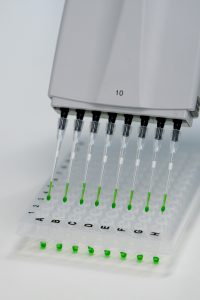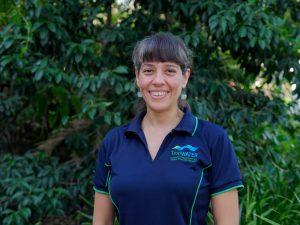About
 As the pace of development increases, there is a pressing need for more information on the health and biodiversity status of our aquatic environments. However, field sampling, especially in remote locations in northern Australia, is expensive and poses many resourcing, safety and logistical challenges. This has limited our knowledge of aquatic biodiversity in such areas.
As the pace of development increases, there is a pressing need for more information on the health and biodiversity status of our aquatic environments. However, field sampling, especially in remote locations in northern Australia, is expensive and poses many resourcing, safety and logistical challenges. This has limited our knowledge of aquatic biodiversity in such areas.
Environmental DNA (eDNA) is an efficient, non-invasive and easy-to-standardise sampling approach, with field sampling that can easily be conducted by non-scientists. Essentially, we can collect a sample of water and analyse it for the gene sequences of the animal and plant species present in that water sample. This approach is transforming environmental science. Whether using the single-species (species-specific) or community level (all species) approach, eDNA techniques have a wide range of applications from biodiversity monitoring, early detection of invasive species, to animal diet assessment. These techniques can be used for a wide variety of taxonomic groups such as bacteria, viruses, fungi, plants, crustaceans, molluscs, invertebrates, fish, amphibians, birds and mammals.
TropWATER is leading a large-scale research programme that aims to develop rapid and cost-effective eDNA technology to identify and monitor northern Australian aquatic species. The eDNA technology is revolutionising how we investigate life underwater and the TropWATER team are experts in using eDNA-based approaches for improving our understanding of freshwater biodiversity, as well as applying it in practical monitoring and species assessment. We are currently applying eDNA techniques to estimate the presence and distribution of aquatic invasive species (tilapia, climbing perch, cane toads, cabomba), rare and endangered species (sawfish, frogs, turtles), and to determine the potential effects of fish passage barriers on barramundi movements. Our eDNA techniques can also be applied in the marine environment and for the detection of terrestrial species such as birds and mammals.
Services
TropWATER offers a range of services tailored to your needs, from primer design to sample collection and analytical services. We can provide you with full instructions along with an eDNA sampling kit, or we can offer sample collection and analytical service. Our testing services come complete with a DNA-free sampling kit delivered to your door, a full report and professional advice. We pride ourselves on a fast and professional service.
 TropWATER provides state-of-the-art sequencing services and instrument availability to promote advances in genomics and molecular biology research. Located at James Cook University’s Australian Tropical Science and Innovation Precinct (ATSIP). We have a dedicated eDNA lab with new efficient equipment and are developing new, more effective methods and protocols for field collection and laboratory analysis. Our services are available to investigators from institutions nationwide.
TropWATER provides state-of-the-art sequencing services and instrument availability to promote advances in genomics and molecular biology research. Located at James Cook University’s Australian Tropical Science and Innovation Precinct (ATSIP). We have a dedicated eDNA lab with new efficient equipment and are developing new, more effective methods and protocols for field collection and laboratory analysis. Our services are available to investigators from institutions nationwide.
Our Services
Primer design:
We can design and validate eDNA assays to target any organism, from bacteria to large mammals. Specificity and accuracy are the two main features of our primers, which make them optimal for eDNA application.
Consultation services:
1. Experimental design: Optimal sampling design is crucial in order to capture the eDNA in a water body. We provide guidance to determine the best suited sampling design that will maximize the probability of capturing the target species eDNA from a given location.
2. Sample collection: Good practices during sampling collection reduce the contamination risks and therefore, give reliable results.  We conduct fieldwork throughout Australia and have specific water collection protocols tailored for different ecosystems and target species. We use technology that enables us to filter large volumes of water, increasing the chances of capturing eDNA of rare species. Also, our sample preservation method does not require refrigeration, allowing us to conduct work in remote areas or through the use of non-specialist partners or citizen scientists.
We conduct fieldwork throughout Australia and have specific water collection protocols tailored for different ecosystems and target species. We use technology that enables us to filter large volumes of water, increasing the chances of capturing eDNA of rare species. Also, our sample preservation method does not require refrigeration, allowing us to conduct work in remote areas or through the use of non-specialist partners or citizen scientists.
3. Sample processing:  Extracting the eDNA efficiently from field samples is as important as having a good sampling design. The TropWATER eDNA team has developed laboratory protocols to maximize eDNA recovery from field samples, which guarantees the reliability of our results. We also have laboratory equipment that allows extracting eDNA from large volumes of water, without having to filter.
Extracting the eDNA efficiently from field samples is as important as having a good sampling design. The TropWATER eDNA team has developed laboratory protocols to maximize eDNA recovery from field samples, which guarantees the reliability of our results. We also have laboratory equipment that allows extracting eDNA from large volumes of water, without having to filter.
4. Data analysis: TropWATER scientists have vast experience handling eDNA data.
5. Data visualization: We provide a full report that includes a description of the field and laboratory methods, as well as results and interpretation of the findings.
Training and workshops:
We train staff members (including rangers) from organizations that are willing to incorporate eDNA as part of larger monitoring programs.
If you are considering conducting eDNA tests as part of your research or monitoring program, please contact us. We will be able to discuss with you what services are best suited to your needs.
Cost and Process
Email us directly at Tropwater@jcu.edu.au for information about TropWATER eDNA Laboratory Services, including sampling protocols, services and costing.

